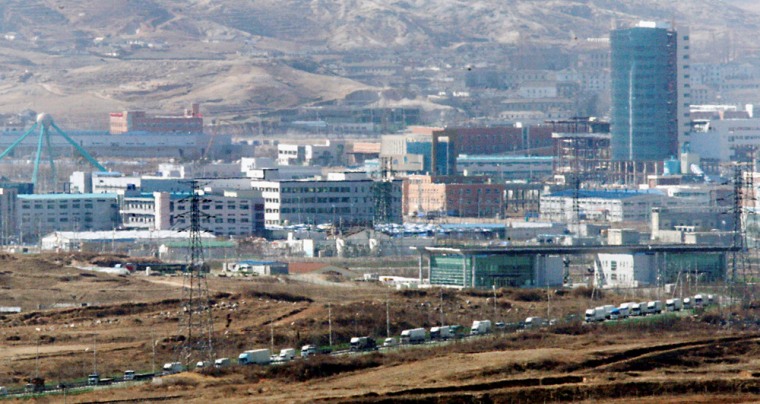A day after closing the border and stranding hundreds of South Korean workers, North Korea relented Tuesday and allowed managers to get back to the business of running the factories that bring the communist regime much-needed currency.
Pyongyang on Monday barred overland border crossings and cut off the only remaining military hot line between the two Koreas to protest joint U.S.-South Korean drills under way across the South despite North Korean warnings the maneuvers could trigger war.
The move left hundreds of South Koreans who work in factories just across the border in the North stranded on both sides of the Demilitarized Zone, with those seeking to head south for the night stuck in Kaesong and others trying to get to work idled for a day.
One South Korean said he was confident he'd eventually get back south — but was worried he wouldn't have anything to eat.
"I had concerns whether I could have a meal because there's no gas in restaurants" in Kaesong, Kim Moo-ju told South Korean reporters after crossing the border Tuesday. "I bought instant noodles and drinks and brought them back to my dormitory."
The North agreed Tuesday to let workers through the border, the Unification Ministry said in Seoul. However, Pyongyang said the hot line would remain suspended throughout the duration of the military exercises, set to last through March 20.
About 210 people made it back from jobs in Kaesong and at the nearby tourist resort at Diamond Mountain, about nine miles from the DMZ, while another 240 went into Kaesong on Tuesday, officials said.
"Movements of people and vehicles across the border have now returned to normal," ministry spokesman Kim Ho-nyeon said.
Strained relations
Relations between the two Koreas, which remain divided by a heavily fortified Demilitarized Zone, have deteriorated since conservative President Lee Myung-bak took office a year ago.
Last year, the North announced it would ban most cross-border traffic because of the tensions — except to a skeleton staff of South Korean employees who run factories that produce everything from shoes to clocks and are a crucial source of cash for the impoverished country.
Pyongyang likely has no intention of completely shutting down a complex that generates millions of dollars a year. But the one-day shutdown served as yet another reminder to Seoul and Washington that the strain in relations will have consequences, said analyst Hong Ihk-pyo of the Korea Institute for International Economic Policy.
"North Korea made its point clear: Inter-Korean economic cooperation is directly linked to politics, and South Korea and the U.S. are causing the trouble," he told the Yonhap news agency. "They are reminding South Koreans of the benefits of peace they have lost over the past year."
The joint drills in the South have put Pyongyang on edge, with the regime ordering its 1.2 million troops on alert and state media warning that even the slightest provocation — by land, air or sea — could spark a war. Last week, the North threatened danger to South Korean passenger planes flying near its airspace during the 12-day maneuvers.
The North also warned against attempts to interfere with its plan to send a satellite into space — a launch that regional powers fear may be a cover for the test-fire of a long-range missile.
"Shooting our satellite for peaceful purposes will precisely mean a war," North Korea's military said in a statement carried Monday by the official Korean Central News Agency.
Tensions rising
South Korea's defense minister said the North has nothing to gain by issuing threats.
"The recent series of provocative and tension-raising rhetoric and acts are not only straining inter-Korean relations but also making it impossible to rule out the possibility of clashes in land, sea and air," Lee Sang-hee said Tuesday.
Analyst Yang Moo-jin of the University of North Korean Studies predicted that warnings of a maritime skirmish could be next.
On Yeonpyeong, an island off the west coast just seven miles from North Korean shores, residents tried not to think about the possibility of a naval battle in nearby waters, site of two skirmishes in the last decade.
"It does make me a bit nervous now that the tension with North Korea is rising," said Choi Ok-sun, 53. "But we will continue our fishing and the rest as normal."
More on: |
